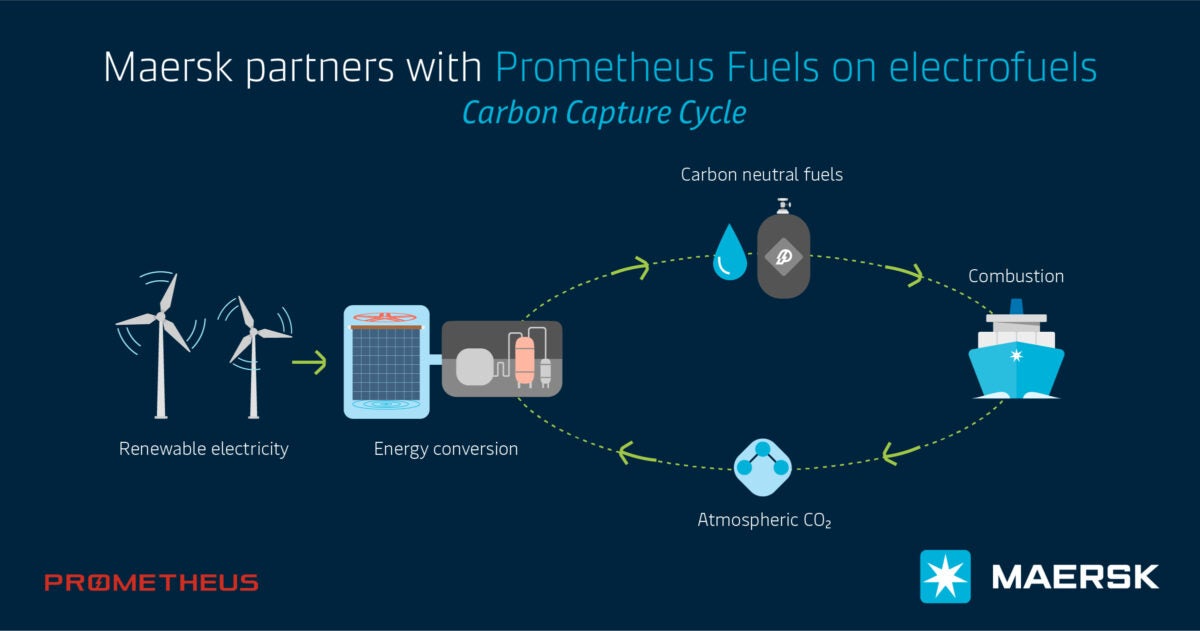A.P. Møller – Maersk made a minority investment in electrofuels production company Prometheus Fuels on Thursday.
Maersk is not putting all of its eggs in one basket when it comes to alternative fuels. The company is considering biodiesel, alcohols, lignin-enhanced alcohols and ammonia as potential tools in decarbonizing its massive fleet of ocean vessels, according to a release. But Prometheus clearly has caught the company’s attention as well.
Prometheus Fuels’ electrofuel emits only oxygen, uses captured carbon dioxide from the atmosphere, results in zero waste products and doesn’t compete with food production like some biofuels. Because it relies on renewable energy and ambient air, Prometheus said the scalability is virtually endless.
Prometheus closed a series B funding round with a $1.5 billion valuation, making it the “world’s first electrofuels unicorn,” the company announced Thursday. Megaplanet and BMW were additional investors in Prometheus during the funding round.
“Prometheus Fuels is developing a very exciting and innovative technology to produce carbon based electrofuels from direct air capture of CO2. Electrofuels are expected to play a key role for the decarbonization of shipping and, if scaled successfully, Prometheus Fuels’ technology will address a key constraint for carbon based electrofuels — namely, the cost competitiveness of direct air capture,” Morten Bo Christiansen, head of decarbonization at Maersk, said in the release.
This investment is another step in Maersk’s journey to net-zero emissions by 2050. The company has made several moves to build methanol-powered vessels and secure the bio-methanol and e-methanol production to fuel those vessels.
Read: Maersk invests in bio-methanol production company WasteFuel
Read: Maersk enters agreement for 8 methanol-powered vessels
The fuel details
The Santa Cruz, California-based electrofuels company uses its Titan Fuel Forge system to collect carbon dioxide directly from the atmosphere and turn it into fuel using a series of membranes and catalysts. The process splits, charges and filters out carbon, hydrogen and oxygen molecules to eventually create long-chain alcohols that become usable shipping fuel.

One Titan Fuel Forge has the capacity to collect 9 kilotons of carbon dioxide from the atmosphere and turn it into 1 million gallons of gasoline in a year, according to Prometheus.
“We’re very pleased to see continued investment into decarbonizing liquid fuels. In the EV hype, we can often overlook the infrastructure needs to scale that solution. What Prometheus is promising would result in a net-zero liquid fuel that can be introduced into current fuel supply chains, simplifying its distribution and scalability. Promising technology and, I must admit, the best website experience I’ve seen in a long time,” said Tyler Cole, director of carbon intelligence at FreightWaves.
The animated website touts Prometheus’ fuels as costing the same as or less than fossil fuels. Considering a large barrier to alternative fuel adoption is the higher costs, this could be a game changer — and not just for the shipping industry. Prometheus’ technology can be customized to produce gasoline, diesel or jet fuel, making it a potential carbon-neutral fuel for multiple transportation modes.
“Our electrofuel offers a truly viable solution to decarbonize shipping — one that can scale and be implemented in time to avoid catastrophic global warming. We’re excited to partner with Maersk, a global leader in decarbonization in the transportation and shipping industries, to accelerate this transition,” said Rob McGinnis, founder and CEO of Prometheus Fuels.
Click here for more FreightWaves articles by Alyssa Sporrer.
Related Stories:
Call to action: Governments’ commitment vital to decarbonize shipping by 2050
Biden target: Produce 3B gallons of sustainable aviation fuel by 2030
Shipping groups want action on $5B fund for zero-emission fuels, tech










